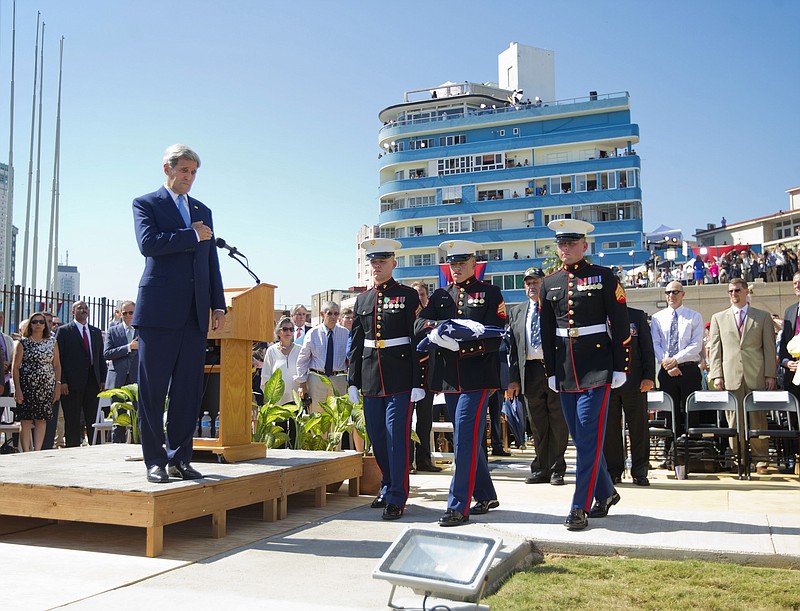If Cuba takes steps toward -- and within a few years fully embraces -- democracy, as Secretary of State John Kerry called for in a speech in the island country Friday, President Barack Obama truly would be able to point to his desire to restore diplomatic relations with the country as a significant foreign policy achievement.
"We remain convinced," Kerry said at the newly reopened United States embassy in Havana, "the people of Cuba would be best served by genuine democracy, where people are free to choose their leaders."
That Cuba doesn't have the ability to choose its leaders today, that it hasn't had such an ability in more than 55 years, is the reason 10 previous presidents have not chosen to restore diplomatic relations with the country.
As we've seen with once-totalitarian nations such as Russia (as part of the former Union of Soviet Socialist Republics) and Iraq, democracy is easier called for than mastered.
Kerry's speech was broadcast live on state television and radio, rebroadcast later in the day, and then the text of his speech was printed Saturday morning in the official Communist Party newspaper.
Reporters following the secretary of state's speech found Cubans willing to say they welcomed the call for democracy and liberty amid the country's stagnant economy, bureaucracy and strife-causing central planning, but the Cuban government offered no such olive branches.
Instead, talking to reporters following Kerry's speech, foreign minister Bruno Rodriguez opted to complain about what he said was longtime U.S. interference in Cuban affairs, U.S. control of the Guantanamo naval base on the island and the U.S.'s own internal struggles with civil liberties.
Longtime dictator Fidel Castro had stirred the pot even before the embassy reopening, saying the U.S. needed to pay Cuba millions of dollars in reparations.
A day after the reopening, to which opponents of the country's socialist government were not invited, the call for democracy had quickly soured.
"Let the Americans come and bring the good but not the bad," a 67-year-old retired driver for a state company told the Associated Press. "The majority of Cubans don't want to change our system."
Thus, what happens with Cuba for the rest of Obama's presidency should offer a sense of how the restoration of diplomatic relations is going.
If the administration cozies up to Cuban government officials and attempts to broker business - through the likes of executive orders that get around the trade embargo that still exists between the two countries - nothing will have been gained. If the human rights abuses such as murders and jailings that have permeated the country in the reign of the Castro brothers continue, restoration of diplomatic relations will be an abject failure.
Kerry seemed to acknowledge as much in talking to reporters after his speech.
"There is no way Congress is going to vote to lift the embargo," he said, "if [Cuba's] not moving with respect to issues of conscience."
Indeed, Republican presidential candidate Sen. Marco Rubio, the son of Cuban immigrants, said he would end the new diplomatic relationship.
"We have an existing law that governs our relationship with Cuba, the Cuban Democracy Act," he told Fox News' "America's Newsroom" show. "It says in order for U.S. policy to change, Cuba must make changes, too. As president, I would enforce that law that requires reciprocal changes in Cuba. I would not recognize an illegitimate government."
Since Obama announced the start of normalization talks in December, more than 3,000 political detentions have been made in Cuba, according to the Cuban Commission for Human Rights and National Reconciliation.
That doesn't sound much like a country willing to change.
Cuba desperately wants more U.S. money floating around the island, and American companies would love to have the nation 90 miles off the Florida coast as one of their clients. Imagine Chattanooga-made 2016 Volkswagen Passats replacing 1954 Chryslers, for instance.
However, the Cuban government isolates most of its money in the hands of relatively few, while the state is all but destitute. Workers, for example, receive only 8 percent of their salaries if they work for foreign companies.
And what is borrowed off-island isn't always paid back. In 2014, for instance, Russia had to write off 90 percent of the $32 billion Soviet-era debt it was owed. Within the past five years, the country also has defaulted on billions owed to Mexico, China and Japan.
At this point, any kind of American business with Cuba seems like it will be only be business as usual for the communist country.
Yet it's conceivable Obama's opening could create a keyhole in which the Cuban people demand a new way of life. If it happens, the president will have been right when he said, in announcing the Cuban policy changes in December, that "a future of greater peace, security and democratic development is possible if we work together to advance the dreams of our citizens."
But don't hold your breath.
